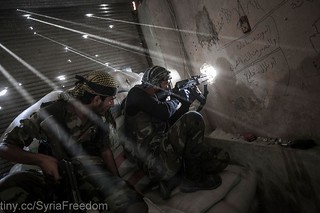We started this. That’s what I can’t help thinking every time I hear about the latest death and suffering in Syria. When the US and Britain invaded Iraq in 2003, we set off a chain of events that led inexorably to the killing fields of Damascus and Aleppo.
I watched it begin when I was working as a reporter in Iraq. I remember going to an interview at a hospital south of Baghdad: the moment I stepped into his office, the doctor told me “You have to get out of here. They’re hunting you.” A few weeks later, I was in a 150mph car chase in the same area, when strangers tried to make us pull us over on a road that became notorious for attacks.
“They” were followers of Al-Qaeda, Sunni extremists who were streaming to Iraq from across the Middle East. It was becoming a regional war, even then.
We all thought they were coming for us, to fight against the Western occupiers of Iraq. But as things turned out, we were just a sideshow.
2 March 2004. That was the day it began in earnest. Shia Muslims had gathered in the city of Karbala for one of their holiest festivals. Sunni militants attacked them, setting off suicide bombs and firing mortars and rockets into the fleeing crowds, killing at least 178. I was there: I remember running for cover, the panic as the explosions got nearer.
This wasn’t just a war of resistance against foreign occupation. It was the return of a centuries-old struggle between Sunni and Shia.
When the Americans and British overthrew the Saddam Hussein regime, the Shia majority in Iraq who had lived for generations under Sunni rule saw their chance to seize control. The Sunni militants were determined to prevent that by any means possible. And so the civil war began.
It was internationalised from the start. On the Sunni side, Iraqis fought alongside the foreign Al-Qaeda followers; the Shia were backed by Iran.
While we in the West were caught up by the horror of the hostage beheadings, Iraqi society was fracturing in the most catastrophic way imaginable. Communities that had been mixed were suddenly divided. You could be killed just for living in the wrong street. Neighbours who had known each other for years were suddenly enemies. I tried to capture some of this in the novel I wrote about Iraq, The Burden of the Desert.
No one was simply Iraqi any more: they were Sunni or Shia. Minorities, like Iraq’s ancient Christian community, stood little chance and began to flee the country – just as they are now doing in Syria. There’s a reason for the similarity: it’s the same war.
When they lost to the Shia in Iraq the Al-Qaeda followers turned their attention across the border to Syria, where a Sunni majority lived under another minority regime – President Assad is Alawite, a different type of Shia from those in Iraq and Iran, but equally an enemy to the Sunni extremists. If they couldn’t hold Iraq, they would take Syria.
The old colonial borders meant nothing to them: they crossed them at will. The only divisions they recognised were Sunni and Shia, Muslim and non-Muslim.
They swiftly hijacked what had begun as an “Arab Spring”-style uprising in Syria. What is happening there is not an internal conflict any more. The most powerful rebel groups are international jihadists.
There’s a reason there have been relatively few Al-Qaeda attacks in the West in recent years: Al-Qaeda has been busy in Syria and Iraq. Al-Qaeda is a movement, not an organisation, and its strongest rallying cry at the moment is Syria.
International Shia have entered the war too, the Lebanese Hizbollah fighting alongside the Syrian army. Syria is the frontline in a regional Sunni-Shia war.
Even more disturbingly, it has been internationalised at another level. Shia Iran is backing the Assad regime, while Sunni Saudi Arabia and Qatar are providing weapons and support to the jihadist rebels.
What is happening in Syria now is a proxy war for domination of the Middle East between its two remaining Muslim powers, Saudi Arabia and Iran. There is a danger that could get out of hand. And if it does, it’s worth remembering that the world’s largest oil reserves lie under Saudi Arabia, Iran, and the land between them: Iraq.
Tony Blair claimed last year that by invading Iraq, the US and Britain prevented an Iraqi civil war “worse than Syria”. In fact, it caused an Iraqi civil war, which in turn caused the Syrian civil war.
When the US and Britain invaded Iraq, they opened Pandora’s Box. And the chaos that emerged is a long way from over.
This post originally appeared in The Huffington Post UK Blog on 28 February 2014



We all hope the leaders of our governments have smart, long range thinkers running them. Yet when the results of a simple military invasion to remove Saddam Hussein from power turns into the mess in that has erupted in the middle east, one has to question if they even considered the consequences? Great post.